The Wisdom Buddha Protector of Je Tsongkhapa's Tradition
Spiritual Lineage
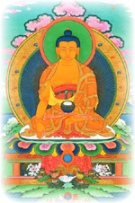
Buddha
Shakyamuni
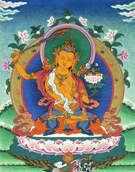
Buddha
Manjushri

Je Tsongkhapa
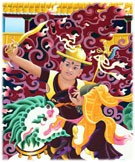 Wisdom Buddha
Wisdom Buddha
Dorje Shugden
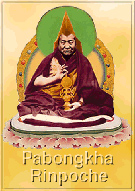
Pabongkha Rinpoche
(1878-1941)
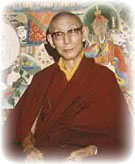
Trijang Rinpoche
(1901-1981)
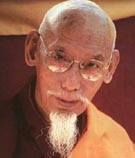
Song Rinpoche
(1904-1984)
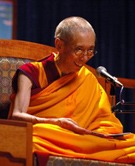
Geshe Kelsang Gyatso
(born 1931)
An interview with an Abbot of a Gelugpa monastery
An interview with an Abbot of a Gelugpa monastery on how the ban has affected him and his fellow monks, the impossibility of escape, and how this ban is destroying the Gelugpa tradition from within. October 6 th, 1997, with Dr. Ursula Bernis:
An abbot of a Gelugpa monastery, an incarnate Lama, a Geshe, well educated, in his seventies, very gentle, soft spoken, kind and warm. He did not know me and I had no introduction. We talked in Tibetan and after just a few minutes he took me into another room where we could speak in private. The monastery has given up performing Dorje Shugden rituals officially or in groups, but many of the monks still continue privately. He did not want his name to be used publicly.
Q: How has the ban affected you?
A: It has caused us great difficulties. We are at a crossroads. The dilemma is whether to follow His Holiness and throw away our commitments to our root Gurus or to keep that commitment and displease His Holiness. This dilemma has caused untold inner turmoil. We lost our peace of mind. Often I cannot sleep; my mind is always on this subject. The inner turmoil prevents any kind of deep Dharma contemplation for which the mind has to be calm.
Those of us who live in India have considered escaping the difficulties created by the conflict. For example, if we want to attend His Holiness' teachings, he says those who rely on Dorje Shugden cannot come. This is a source of deep hurt and stigma. If we went back to Tibet, we could not be sure that our freedom of religion would be upheld there. If we went to other countries, we could not be sure that we could continue to practice the same way as now because of so many different circumstances. So the ban has created many complications. It has even caused madness.
Q: How will this affect the future of the Gelug tradition?
A: It will weaken it because there is no trust among Gelugpas anymore. Some will follow the Dalai Lama and some their root Guru. Naturally there will be some fighting and hence more mistrust. In one way or another, everyone within the Gelug tradition will break their damtsig, their sacred word and commitments. Conflict arises between parents and children, husband and wife, Ganden Jangtse and Shartse, which were so close before and had good relations. The two main colleges of Ganden monastery now oppose each other and so much conflict has sprung up between them. For example, Serkong Tsenshab Rinpoche told many people not to rely on Dorje Shugden. Now these people say instead of offering tormas or ritual cakes to the protector, we must offer him shit. This kind of hatred creates so much bad karma. This is how the Gelugpa tradition is changing. These days we have to be like the Gelugpas during the Kagyu wars of the early 17 th century when Geshes wore hats that were red on the outside with the yellow hidden on the inside. When they were caught wearing yellow hats, they would be punished.
Today, the situation is like this: Dorje Shugden followers say bad things about the Dalai Lama and this creates more conflict and more discrimination against Dorje Shugden followers. This becomes a cycle of ever larger and deeper conflicts. Like two stones hitting one another -- one needs to worry about fire. Neither side is willing to change. Personally, I am worried that the conflict will escalate into a larger one, since both sides are dug in. They will die for their positions. In future, this might split the Tibetan community. The Tibetan government in Dharamsala says there are just a few Dorje Shugden followers, but this is not true. There are so many, about one third of all Buddhists who really practice (not of the general population) rely on Dorje Shugden. Because Tibetans don't have the freedom, they are afraid to speak out.
The exile Tibetans are supposed to be democratic, but they are not. For example, in the monasteries, if someone goes against the abbot, he is suspended. The Tibetan government acts the same way. Their structure and actions are the same as that of a monastery. The Tibetan government is not true, not honest. They have democracy on their tongue but do not act on it. I am only saying this because I am really fed up with their actions and all of these conflicts they have created. I am speaking from my heart, not merely complaining. We lost our leader and we have no others. Everyone is too scared.
Political Leader
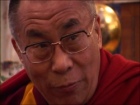 Dalai Lama
Dalai Lama
The Hypocrisy
Follow the story of the Dalai Lama's 30-year political campaign to destroy a centuries-old spiritual tradition taught to him by his own Spiritual Guide, and the efforts of those he's hurting to stop him:
Brief summary
- What is happening
- What is the Western Shugden Society (WSS)?
- Detailed reports of discrimination from inside India and elsewhere
The Dalai Lama's position
- A Great Deception
- Praise to Wisdom Buddha Dorje Shugden by the Dalai Lama
- In the Dalai Lama's words
Why is this happening?
- Why is this religious suppression taking place?
- Are the Dalai Lama's reasons valid?
Efforts to restore religious freedom
- Geshe Kelsang's open letter
- The ban is illegal and unconstitutional
- Press reports and videos
- Dorje Shugden Devotee's Charitable and Religious Society
- Dalai Lama sued for repressing religious freedom
- A conflict with a solution
- Announcement from Serpom Norling Monastery
Analysis of situation
- Sectarianism
- Can the Dalai Lama ever make a mistake?
- Is the Dalai Lama the only spiritual leader in Tibetan Buddhism?
- Theocracy or democracy?
- Spirit worship or authentic Buddhist practice?
- Freedom of worship
- The Dalai Lama's justifications
- Analysis by Dalai Lama's translator (PDF)
- What would Thomas Jefferson think of the 14th Dalai Lama?
- Book Reviews
- Videos
Evidence and first-hand accounts
- Chronological background
- Discord in exile documentary
- Political motivations for the ban
- Summary to date from Tibetan exiles
- Other
Ongoing persecution 2008-2010
- Recent vote sticks and call for help
- Forced signature and ID card campaign
- Persecution of monks at Sera Monasteries
- Public humiliation and explusion of monks
- Letter to Indian Prime Minister regarding abuses
- Letters from Dorje Shugden Devotees
- Urgent appeal from Sera Monasteries
- Support from Indian police
- Western Shugden Society letter to Sera monasteries
- Western Shugden Society letter to TGIE
- Heartfelt request from monks in Mundgod
- More discrimination planned around the world
- Letter from an FPMT monk
- Other
- What you can do